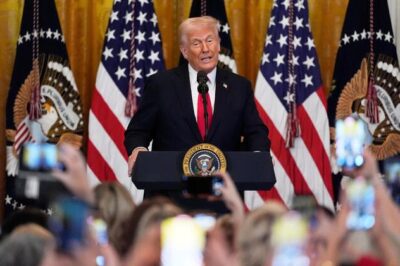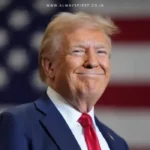
The legal challenges to President Donald Trump’s controversial tariffs are officially underway, with the first lawsuit targeting his sweeping trade policies now filed. The lawsuit, which challenges Trump’s use of emergency powers to impose new tariffs, sets the stage for further legal battles over his tariff strategy, which critics argue is an overreach of executive authority. The case, filed by the New Civil Liberties Alliance (NCLA), questions whether the president’s actions under the guise of a national emergency are constitutional.
The Tariffs at the Center of the Legal Challenge
The lawsuit specifically targets the 20 percent tariffs that Trump imposed on Chinese goods earlier this year, a move that the administration justified by declaring a national emergency. According to the Trump administration, China’s role in supplying fentanyl and its precursor chemicals to the U.S. represents a national security threat, which provides the legal grounds for these tariffs under the 1977 International Emergency Economic Powers Act (IEEPA). This law gives the president broad powers to respond to international threats, but critics contend that the law has been misused in this instance to impose economic measures on a trade partner.
The Trump administration’s rationale for these tariffs extends beyond the fentanyl issue. Trump has also announced additional tariffs aimed at addressing what he sees as a growing U.S. trade deficit, invoking the IEEPA again. This has raised eyebrows among legal experts, with many questioning whether such a broad use of emergency powers to alter trade policy is permissible under the U.S. Constitution.
The Constitutional Debate: Separation of Powers at Stake
At the heart of the legal challenge is a fundamental question about the separation of powers between the executive and legislative branches of government. The U.S. Constitution grants Congress, not the president, the authority to regulate trade and impose duties. Legal scholars argue that Trump’s reliance on emergency powers to unilaterally alter trade policy could set a dangerous precedent, undermining Congress’s role in shaping U.S. trade policy.
“This is a highly unusual and potentially unlawful use of the IEEPA,” said legal experts familiar with the case. They emphasize that no other president has ever invoked emergency powers in such a broad and controversial manner to impose tariffs. The lawsuit aims to test the limits of presidential authority under the IEEPA, making this a potentially landmark case that could shape future U.S. trade policy for years to come.
A Growing Legal Pushback from Business Groups
While the NCLA’s lawsuit is the first to challenge Trump’s tariffs in court, it is unlikely to be the last. Multiple business groups, including some major industry associations, are reportedly considering their own legal actions in response to the tariffs. Many of these groups argue that the tariffs will cause serious disruptions to global supply chains, raise consumer prices, and invite retaliatory measures from key trade partners, including China and the European Union.
The impact on global trade has been a major concern for businesses that rely on imports for manufacturing and production. These groups worry that escalating trade tensions could harm the U.S. economy, particularly in sectors such as agriculture, technology, and retail. Furthermore, the growing trade conflict could undermine the benefits of global trade agreements and partnerships that have helped fuel economic growth in recent decades.
Setting a Dangerous Precedent: Executive Power Overreach
Beyond the immediate economic impacts, critics of Trump’s tariff policies warn that the use of emergency powers to impose tariffs could set a dangerous precedent for future presidents. By expanding executive authority over trade, the administration could significantly alter the balance of power between the legislative and executive branches. Legal experts argue that allowing the president to unilaterally implement such significant economic policies undermines the role of Congress in regulating trade and making decisions about U.S. foreign policy.
This concern is particularly relevant in light of the growing number of tariffs and trade actions being taken by the Trump administration. With each new round of tariffs, the president expands his authority, raising questions about how far executive power can stretch before it violates the constitutional limits set by the framers of the U.S. government.
Implications for U.S. Trade Policy and Future Legal Battles
The outcome of these legal challenges could have wide-reaching consequences for U.S. trade policy. If a judge were to rule that Trump’s use of emergency powers under the IEEPA is unconstitutional, it could block his efforts to unilaterally impose tariffs. This would not only stop the imposition of new tariffs but could also undo many of the tariffs already in place, which could reshape the trade dynamics between the U.S. and its partners.
The ruling could also set a critical precedent for future legal challenges to executive actions related to trade. If the courts determine that the president overstepped his constitutional authority, it could limit the ability of future administrations to use emergency powers to bypass Congress when shaping trade policy. On the other hand, if the courts side with the administration, it could embolden future presidents to take similar actions, potentially leading to further erosion of congressional power over trade.
Looking Ahead: A Prolonged Legal Battle
With the NCLA’s lawsuit now in motion, it’s clear that the legal challenges to Trump’s tariffs are just beginning. Business groups, legal experts, and trade partners are closely watching the case as it progresses through the courts. The outcome could have significant implications not only for the Trump administration but also for the future of U.S. trade policy and the balance of powers in the federal government.
As these legal battles unfold, the wider impact on global trade remains uncertain. What is clear, however, is that the legal questions raised by Trump’s tariff policies are far from settled, and the fight over executive power in trade policy is likely to continue for some time.








































Leave a Reply